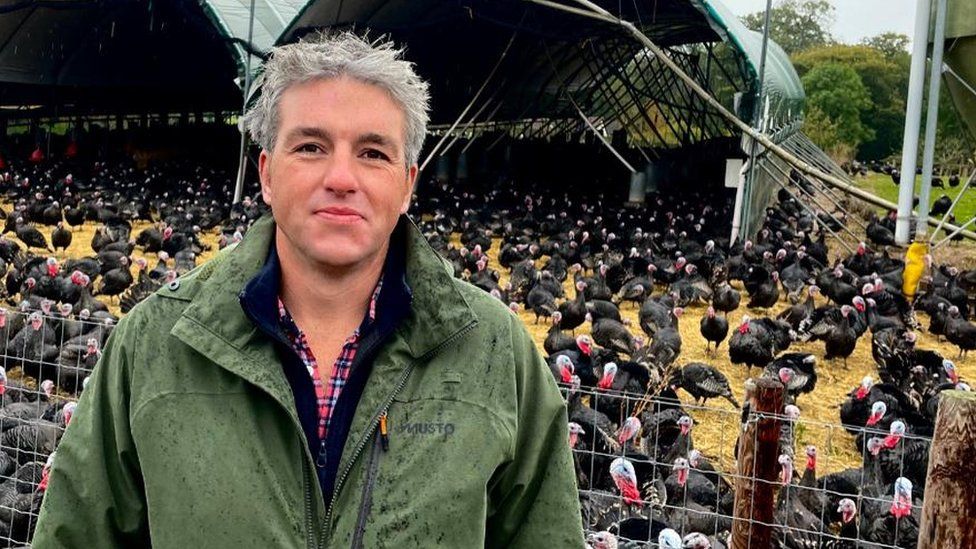Christmas hope for turkey farmers as bird flu cases drop
- Published

Tom Copas is hopeful he will be supplying tens of thousands of Christmas turkeys this year
Turkey farmers are hoping for a better Christmas after a drop in cases of a virulent strain of bird flu that led to culls and shortages last year.
Figures shared with the BBC list 16 new outbreaks since August, compared to nearly 90 in the same period last year.
Farmers faced a crisis last winter as bird flu deaths and culls left a shortage of free-range turkeys.
Scientists also said they have discovered signs of immunity in wild birds previously spreading the virus.
The consortium of scientists from eight leading UK laboratories has also discovered the virus can only travel short distances in the air - less than 10m - and is "very unlikely" to travel between farms.
Berkshire farmer Tom Copas welcomed the news and said the industry had upped its biosecurity and was much better prepared than last year.
But Mr Copas, who farms up to 60,000 free-range Christmas turkeys, called for a vaccine to be introduced to provide better protection from the highly contagious virus.
Last year, a national housing order saw free-range birds brought indoors
He told the BBC: "I think fundamentally, looking at where bird flu is across the world, you need a vaccine in place, realistically, to give confidence to businesses to continue to take the risk of putting birds on the ground. We need that as an industry."
Of last year's spread of the virus, he said: "It was one thing (to think) what are we going to do as a business, but so many people were relying on you for Christmas dinner and you just had no control because the way it jumped around the country was terrifying."
Essex turkey farmer Paul Kelly, who lost around 30% of his turkeys last year because of bird flu, said the lower number of outbreaks so far this season could be the "lull before the storm".
"We have had such clement weather that we haven't really gone into flu season yet. We won't know the true situation we are in until the winter weather - the genuine cold, damp conditions that the flu virus loves," he said. "The big thing is that there is probably more immunity in the wild bird population so it's not going to spread as much."
Meanwhile, the British Poultry Council warned that it was "too early to say" whether there would be fewer cases over the rest of the winter but it said it did not foresee a Christmas turkey shortage this year.
World's worst outbreak
The world is currently going through its worst ever outbreak of bird flu.
The H5N1 virus, which is the most prevalent strain now, was first reported in China in 1996.
It can spread through entire flocks of domestic birds within a matter of days, through birds' droppings and saliva, or through contaminated feed and water.
More than 350 UK farms have seen infections between 2020 and 2023, according to the Department for Environment, Food and Rural Affairs (Defra).
Mammals that scavenge dead bird carcases, including foxes, otters and seals, have also been infected.
The consortium of scientists, led by the government's Animal Plant Health Agency (APHA), was set up last June, to study the virus and how it spreads.
It said preliminary investigations in a small sample size of some species of seabird, including northern gannets and shag, showed the development of immunity to the H5N1 virus.
But it warned the avian influenza virus was prone to change and the study did not yet suggest "great population-level benefits" from antibodies that had been developed in some birds.
However, the team has also identified the genetic characteristics that explain how the virus is spreading so quickly and infecting such a vast range of species.
Professor Ian Brown said the team of scientists was keeping a watchful ey on the ever-changing virus
While the risk to humans is still considered very low, the consortium is now looking at how it has spilled over into mammals and how it might adapt in the future.
Professor Ian Brown, APHA's director of scientific services, said that the virus was so powerful that one teaspoon of faecal matter infected with H5N1 could kill a million turkeys.
He told the BBC it was always adapting. "It's changed its genetic make-up in such a way that it gives it an advantage over all other flus so it can replicate faster. It can spread more efficiently. It can infect a greater range of birds," he explained.
"It has jumped into mammals. We still need to be watchful that if it does make that jump what happens to the virus and can it make it more able to jump into humans?"
Extra funding of £6.5m has now been given to further study immunity in wild birds, how the virus spreads from wild birds to farmed poultry and the potential for human transmission.
The UK's chief veterinary officer Christine Middlemiss said the "critical" research would help "protect our birds and minimise the impact of this dreadful disease".
Defra also said the impact and efficacy of vaccinations in farming will also be looked at in the months ahead.
Related Topics
- Published10 October 2023
- Published12 October 2023
- Published28 July 2023
- Published2 February 2023
- Published29 November 2022